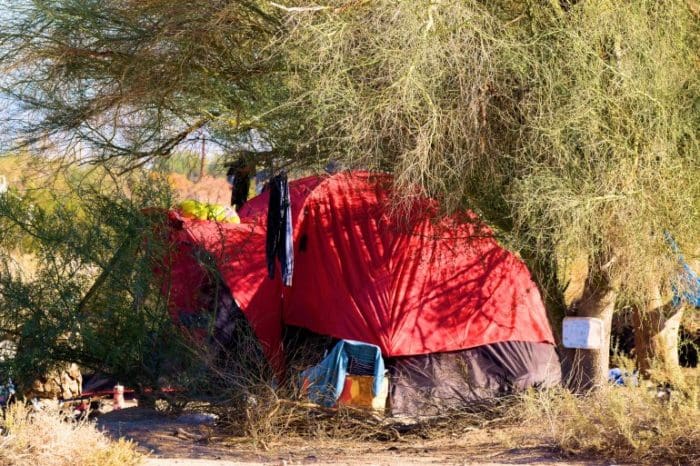“This life’s hard, but it’s harder if you’re stupid.” So said John Wayne once in a movie. Truer words have never been spoken. Meanwhile, residents of an ultra-liberal, gun-eschewing enclave of Minneapolis known as Powderhorn Park have treated themselves to living that quote first-hand after a horde of homeless people displaced by the rioting set up a tent camp in the neighborhood.
Despite drug dealing, armed robbery, overdoses and all manner of other criminal behavior at all hours among their new “neighbors,” the residents have pledged not to dial 911. Instead of calling the cops, Powderhorn Park homeowners have instead delivered meals to the squatters. The residents have also kept their white privilege in check by encouraging the city to back off evicting the vagrants.
The uber-liberal residents of the area — where the biggest day of the year has been May Day — don’t want to exert their white privilege to restore peace, tranquility and safety (not to mention sanitation) to the area. After all, someone’s feelings might be hurt in the process.
A lot of white Americans say they plan to rely less – or not at all – on the police after watching George Floyd’s killing on video. I wrote about an uber liberal neighborhood where that commitment is already being challenged. https://t.co/sHJR8vvGyH
— Caitlin Dickerson (@itscaitlinhd) June 24, 2020
It gets better. Shari Albers, one of the residents profiled in the New York Times piece, now admits the unruly mob right outside her home keeps her up at night. Does she have a gun for home defense? Of course not! That would make her one of those redneck gun nuts.
From the Grey Lady’s description of the situation:
When Shari Albers moved three decades ago into Powderhorn Park, a tree-lined Minneapolis neighborhood known as a haven to leftist activists and bohemian artists like herself, she went to work sprucing it up.
She became a block club leader, organizing her mostly white neighbors to bring in playgrounds and help tackle longstanding issues with crime.
On many nights, she banged on the car windows of men who had come to solicit prostitutes outside her door, she said. She kept meticulous notes when dozens of men would gather in a circle for gang meetings in the park across from her house. After each episode, she called the police.
But times have changed. After the death of George Floyd at the hands of the police, Ms. Albers, who is white, and many of her progressive neighbors have vowed to avoid calling law enforcement into their community. Doing so, they believed, would add to the pain that black residents of Minneapolis were feeling and could put them in danger.
Already, that commitment is being challenged. Two weeks ago, dozens of multicolored tents appeared in the neighborhood park. They were brought by homeless people who were displaced during the unrest that gripped the city. The multiracial group of roughly 300 new residents seems to grow larger and more entrenched every day. They do laundry, listen to music and strategize about how to find permanent housing. Some are hampered by mental illness, addiction or both.
Their presence has drawn heavy car traffic into the neighborhood, some from drug dealers. At least two residents have overdosed in the encampment and had to be taken away in ambulances.
The influx of outsiders has kept Ms. Albers awake at night. Though it is unlikely to happen, she has had visions of people from the tent camp forcing their way into her home. She imagines using a baseball bat to defend herself.
Not being able to call the police, as she has done for decades, has shaken her.
You don’t say. Another woman no longer walks her dog in her own neighborhood because of the catcalls and other harassment. Yet another refuses to let her kids play near the park where the homeless have set up camp.
“I’m not being judgmental,” said Carrie Nightshade, 44, who explained that she no longer felt comfortable letting her children, 12 and 9, play in the park by themselves. “It’s not personal. It’s just not safe.”
What happens if a resident is actually threatened?
Rather than turn to law enforcement if they saw anyone in physical danger, [a group of female residents] resolved to call the American Indian Movement — a national organization created in 1968 to address Native American grievances such as police brutality — which had been policing its own community locally for years.
As Glenn Reynolds wrote, “it would take a heart of stone not to laugh” at these leftists who welcomed their new squatter neighbors.
Ms. Albers may sleep better knowing that once the city council completes the defunding of the police department, she’ll be able to call in community social services workers to deal with the drugs and crime that have moved into her neighborhood.
“I am afraid,” [Albers] said. “I know my neighbors are around, but I’m not feeling grounded in my city at all. Anything could happen.”
Or maybe Ms. Albers should consult her daughter who attributes all the criminal activity by the squatters to “symptoms of systemic oppression” and thus doesn’t blame the individuals who commit it.
Indeed. This life’s hard. But it’s harder if you’re stupid.
